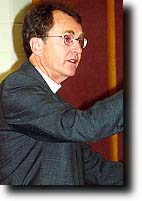Conference: "Resolving the
Conflict Between Significance and Humility"
Speaker - Rev. Robert H.
Linders
 Rev. Linders is Senior Pastor of St.
Paul's Lutheran Church in Doylestown, Pa. (www.stpaulsdoyle.org).
He has been Visiting Lecturer in
Preaching at Catholic University of America, Washington, D.C. and at the
Lutheran Theological Seminary at Philadelphia. His publications include Preaching
About Evil; sermons in two editions of the book, Selected Sermons
(1993/1989) published by the Episcopal Church; articles in Partners and Theology
Today and an article used in the Book of Readings at the 1981 Second
International Ecumenical Congress on the Meaning of Human Suffering. Rev.
Linders earned Master's and Doctoral Degrees from Princeton Theological Seminary
and a Master of Arts in English from Monmouth College, N.J. He was
ordained in 1967 with a Master of Divinity Degree from the Lutheran Theological
Seminary at Philadelphia.
Rev. Linders is Senior Pastor of St.
Paul's Lutheran Church in Doylestown, Pa. (www.stpaulsdoyle.org).
He has been Visiting Lecturer in
Preaching at Catholic University of America, Washington, D.C. and at the
Lutheran Theological Seminary at Philadelphia. His publications include Preaching
About Evil; sermons in two editions of the book, Selected Sermons
(1993/1989) published by the Episcopal Church; articles in Partners and Theology
Today and an article used in the Book of Readings at the 1981 Second
International Ecumenical Congress on the Meaning of Human Suffering. Rev.
Linders earned Master's and Doctoral Degrees from Princeton Theological Seminary
and a Master of Arts in English from Monmouth College, N.J. He was
ordained in 1967 with a Master of Divinity Degree from the Lutheran Theological
Seminary at Philadelphia.
In another arena, Rev. Linders was inducted this year (2001) into the
Gettesburg College Athletic Hall of Fame. In addition to other records, he
posted a time of 1:51.4 in the 880-yard run at the IC4A meet held on May 30,
1964.
Outline of Talk
- First Topic: Significance and Humility
- Humility
- Many of you know Stephen King; he lives near my summer home in
Maine. He has described his accident, in which a van hit him as he
was walking: "When you're lying in a ditch, they don't take
MasterCard." Humility.
- Carl Rodgers: To be personal is to be universal.
Arthur Rubinstein: Leave blood on the keys (piano).
John the Baptist: He must increase; I must decrease.
- After June 24 (each year), the days get shorter. It's about
identity. As our days get shorter, we begin to be concerned
about our reputations, about our legacy.
- Certain passages grow on us. For example,
Bible: "He made of
himself no reputation."
Gregory Peck: "If
you have to tell them who you are, you aren't."
Albert Einstein:
"That man has no right to be so modest; he's not that
great."
My father: "Don't
worry about the blowhard athletes;
think about the quiet ones in the
corner."
William Sloane Coffin
(now in a wheel chair): "Nature becomes more attractive
when we're getting ready to join it."
- Living is learning to die; dying is learning to live.
Jesus's life and death are intertwined in our thoughts.
- Significance
- We are dust and to dust we shall return. Dust is the symbol
of coming to nothing. Also, dust is a symbol of the
ordinary. A billion Chinese have not even heard our
names. Our diseases . . . ?
- Thus, how pathetic are our backhanded bids for
self-promotion. We want to feel important. Some
mausoleums charge more the higher up on the stacks the body is
buried.
- Philips Brooks (19th century preacher): Humility is
learning what the real smallness of your greatness is."
- Samuel Miller: If we cannot love one thing deeply, we tend to love
many things superficially.
- Resolving the Conflict
- Lust: The craving for salt by a man dying of thirst. The
more sea water you drink, the more you want, until you perish.
We consume because we don't love ourselves.
- The Garden of Eden: If you want to know about humility and the way
to live, listen to God, not to some dumb snake!
- My worth is a divine gift, not a human achievement. I have
value because I am loved; I'm not loved because I have value.
You cannot earn love.
- Accept who we are; accept our limitations. That is the way
to humility.
- You don't have the time to get the world to appreciate you.
Use your time to accept yourself.
- Once we have our Father's love, we can go out and conquer worlds.
- Q&A
(answers only)
- If we don't accept our baptism, we don't know our worth; we're not at
home in our own skins.
- Many people are lost because someone at a teachable moment rejected
them, ground them into dust. The story about (Bishop) Fulton J. Sheen and
Josip Broz Tito (dictator of the former Yugoslavia). Sheen's error as an alter boy was treated kindly
by a priest; Tito's similar error brought him a stern rebuke by a
priest. Look how they turned out.
- A sense of security (gained especially from loving parents) aids the
achievement of humility.
- Jesus gave the universal creator a friendly name. He is the
human face of God.
- Our efforts to achieve in life reflect our desire to express
love, not to acquire it. Our efforts are a response to grace.
- Kevin Dolan: Many executives place great significance in their jobs,
their positions. Some in transition won't take lesser jobs.
Rev. Linders: It's like the epitaph: "Born a man, died a
grocer." Quite a come-down, isn't it?
- Second Topic: The World Trade Center Attack
- Goodness of God
- How can we believe in a good God in such a world?
- If we were polytheists, we could ascribe bad events to the
"bad" gods and keep the good things for the
"good" gods.
- But our God is one god; He encompasses both sides. How to
understand this?
- Helen Keller: Darkness and silence need not block the progress of
the human spirit.
- Read the scriptural stories not always literally. They might
not have literal truth but they have eternal truth.
- God is not a traffic cop, helping us, for example, choose the
right wife. He's concerned with eternal good.
- Faith
- When we are young, we see mysteries as things to be solved.
When we're older, we tend to accept the mysteries in and of
themselves, for what they teach us.
- To Christians, the mystery is not capricious but gracious.
- Faith is not believing without proof, but trusting without
reservation.
- Weatherhead: God's will has several forms:
1. Intentional: What God
intends.
2. Circumstantial: What
God allows,
- Free will
- Natural law
3. Ultimate will: the
Paschal mystery - good comes from evil, for example, the
resurrection.
- Doubt is not the absence of faith, but a concomitant of it.
It's the ants in the pants of faith that keep it moving.
- The absence (opposite) of faith is abject apathy.
- Men seldom do evil so maliciously as when they do it in the name
of religion.
- God as Sufferer
- Henri Nouwen: God is a fellow sufferer.
- God suffers along with us. When a young boy was hanged in
the Holocaust, an onlooker asked, "Where is God?"
The answer: "God is up there, hanging with the boy."
- Annie Dillard: If your plane is about to crash, the appropriate
prayer is not "Please, please . . ." but "Thank you,
thank you . . ."
- Concerning the terrorists: It's too early to talk about
forgiveness; we haven't yet fully realized our rage.
(The notes of this outline were taken by David
G. Price. They were wordprocessed by Patrick Lyons.
These notes may not be reproduced without the written permission of the
presenter.
This page was last edited on December 30, 2001 by Patrick Lyons.)


 Rev. Linders is Senior Pastor of St.
Paul's Lutheran Church in Doylestown, Pa.
Rev. Linders is Senior Pastor of St.
Paul's Lutheran Church in Doylestown, Pa.